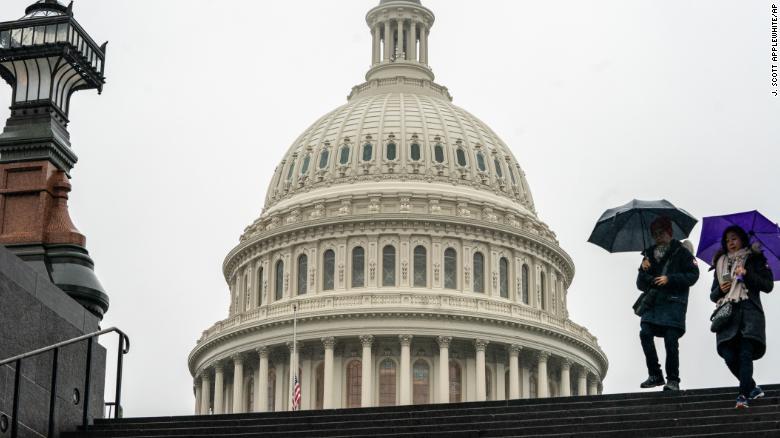(CNN)With about 41% of the US Food and Drug Administration off the job due to the government shutdown, some agency employees worry about the safety and health of the American public.
Agency operations "continue to the extent permitted by law," according to the FDA website, meaning "activities necessary to address imminent threats to the safety of human life and activities [are] funded by carryover user fee funds."
User fees fluctuate, according to the FDA, meaning more employees could be furloughed the longer the shutdown lasts.
"With the shutdown, surveillance is not effective. They are doing the bare minimum to get by," said Geneve Parks, a chemist who tests pharmaceuticals at an FDA lab in Detroit. She says she loves her work but is furloughed along with about half of the 34 to 40 people who work in her lab. Now, she estimates that there are only five people in the chemistry division.
"It's terrifying. What if there's an outbreak?" Parks asked. "What would the agency do if something happened and they don't have the staff to handle it?"
She thinks the agency is doing the best it can with the smaller staff but believes that its reaction time will be much slower and says that could put Americans at risk.
Deaths are "always a concern. When you don't have enough funding, then it becomes a life or death situation," Parks said. "It's scary."
The FDA is officially continuing to oversee food recalls and is monitoring for and responding to outbreaks. In an emergency, staffers can be called back from furlough, and emergency inspections will be staffed, but they'd be kept only as long as needed to address the emergency. The agency is reviewing food and drug imports and conducting some civil enforcement work. It posted a notice about a recall of ceftriaxone for injection, an antibiotic, on Saturday.
"There is no question this has an impact, and it is not business as usual," FDA Commissioner Dr. Scott Gottlieb said. "There is a very concerted effort to stand up critical functions and to focus on our consumer protection mission, in many cases relying on excepted employees not being paid.
"Wherever we can, we will look at the safety mission first and foremost, but you know what will happen is that more of the routine work and more of the day-to-day review work will slow down," Gottlieb said. "A lot of it slowed down already."
Cheryl Monroe, Parks' furloughed colleague in the Detroit lab, worries that the short staffing will have an impact.
"If someone calls and says they've had a bad reaction to a drug, we can't analyze it," Monroe said. With only a couple people left in her part of the lab, she said there is limited routine analysis of drugs and she believes there is no ongoing surveillance in pharmacies.
"Things happen. There are times we pick up pain medication to check it for milligram dosage, and sometimes it's wrong. It could cause death," Monroe said.
Monroe has loved working for the FDA for the past 30 years. However, she thinks this shutdown could have a negative long-term impact. Colleagues have told her they are thinking about quitting.
"A lot of us live paycheck to paycheck," she said, and though she has been through other shutdowns, this one feels different. "I don't see a compromise anytime soon. This one scares me."
Depending on the program, fees that fund the employees' work will last two to three months, Gottlieb said. He added that the agency is trying to figure out how to "slow down the burn rate" and how to channel more resources to the critical safety functions that it routinely performs.
"The most challenging part of this is the human capital side of this," Gottlieb said. "We are asking a lot of people to do work that will miss a paycheck, and not everyone is at the high end of the pay scale. I used to live paycheck to paycheck. We know people will be in difficult circumstances, and we are asking them to do hard things."
Weston Szymanski, a consumer safety officer in the FDA's Stoneham, Massachusetts, office, is working from home without pay.
Szymanski's job is to review commodities at ports of entry. He agrees with Monroe that the shutdown could have long-term consequences, and it could be tough to recruit people to work for the FDA if there is always a shutdown threat. The immediate threat to health and safety is also a real concern.
"When you go out to a restaurant or a grocery store, the American public trusts it," Szymanski said. "There is a higher risk of injury or death in a potentially very, very serious way."
Get CNN Health's weekly newsletter
Sign up here to get The Results Are In with Dr. Sanjay Gupta every Tuesday from the CNN Health team.
The FDA's inspections and surveillance keep contaminated products off the shelf; "it's not a negligible amount," he said.
"We do this job to protect people. We don't do it for the money. We do it to protect our country," Szymanski said. "The real victims are the American consumer and federal government employee."
Szymanski's wife, Jennifer, a chemist who works with food in the FDA's Office of Regulatory Affairs, is also furloughed. She estimates that only about 10% to 25% of the staff is left working in her department.
She too hopes no emergency happens during the shutdown. "We can't do anything right now. We're unequipped to handle anything," she said.
Gottlieb said the agency is looking at ways to bring more employees back into work, but it would be a financial challenge for some.
"When I bring back employees that are not being paid, that means they can't likely be collecting unemployment insurance or looking for a second job," he said. "We are acutely aware that we need to be mindful of the burden that could be imposed on the individual, and we are looking for ways to mitigate that burden. There will be people that can't be in that situation."
Gottlieb has sent messages of reassurance to employees through direct memos, through Twitter, and tweeting pictures of FDA employees who remain on the job.
The FDA has also taken direct steps to help those who are working without pay. For instance, inspectors who have to travel for their jobs are allowed to charge more of their travel expenses to agency-level credit cards so they don't have to run up debt on their individual cards.
Gottlieb expressed continuing admiration for the dedication of colleagues.
"We are a mission-driven agency," he said. "I am humbled by how people are stepping up and showing their true dedication to this work."







